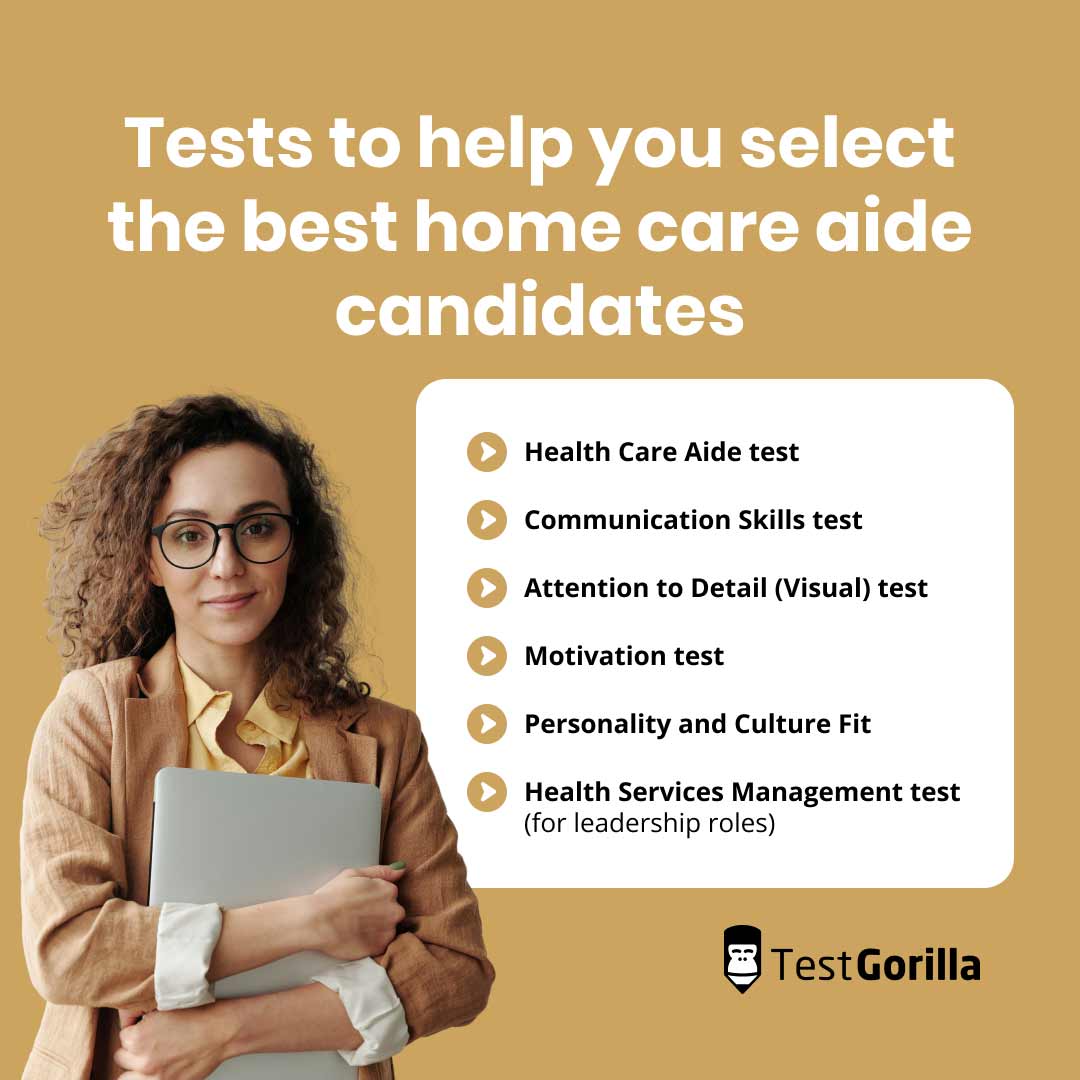Home health care aides offer crucial support to people who need help maintaining their independence. This usually means acting as both a medical assistant and a compassionate constant to those who depend on them.
Home health care aides help with basic medical tasks, household administration, day-to-day activities, and more.
Finding the right fit for your patient’s needs is essential. Making incorrect staffing decisions can lead to patient dissatisfaction, wasted resources, and diminished trust in your agency's ability to provide quality care.
In this guide, we explain what you need to know before you hire home health care aides to prevent a mis-hire. This includes key skills to look for, where to find suitable candidates, and common mistakes to avoid.
Table of contents
- What you need to know before hiring a home health care aide
- Skills and qualifications to look for in a home health care aide
- Where to find skilled home health care aides
- How to select the best home health care aide candidates
- Common mistakes when hiring a home health care aide
- Find the right home health care aide with TestGorilla
What you need to know before hiring a home health care aide
There are a few essential factors to consider when hiring a home health care aide.
Licenses, certifications, and training
You’ll need to consider your home health care aide’s licenses and certifications before you hire them. Candidates will likely need the following qualifications:
However, different states have varying certification and training requirements. For example, in Connecticut the role requires 75 hours of training and 16 clinical hours, but no formal certifications.
On the other hand, those in Idaho need 120 hours of training, 40 clinical hours, and an HHA certification. Therefore, check your state’s requirements before hiring.
Background checks
Performing background checks on your applicants ensures the safety and well-being of your patients. Though there’s no federal requirement to do this, 30 states make it mandatory for home health care workers.
Include these background checks as part of your prescreening process:
Criminal background: You can request a Criminal History Record Check (CHRC) through the Department of Health (DOH).
Abuse and neglect: The National Child Abuse and Neglect Data System (NCANDS) is a voluntary data collection system that will highlight whether the candidate has ever been reported for child abuse.
Employment history: Contacting previous employers or personal references helps verify the candidate's work history, reliability, and suitability for a caregiving role.
Sex offender registry: Candidates on the sex offender registry will have committed a sexually motivated crime. You can check the national sex offender registry here.
Education and certification: Ensure your applicants have all the certifications, qualifications, and experience they say they do.
Driving records: If your candidate will be responsible for transporting patients to and from appointments you should check whether they have a valid driver’s license, a safe driving history, and the correct insurance for their vehicle.
Skills and qualifications to look for in a home health care aide
Home health care aides need a mix of hard and soft skills to be successful in their roles.
Hard skills
Certification and training: Candidates need to have completed their clinical hours training and have up-to-date certificates and licenses.
Medical knowledge: This role requires an understanding of CPR, the ability to perform first aid, and medical knowledge, including body systems, common physical and mental health conditions, and cognitive problems.
Safety protocols: Understanding infection control practices and following safety protocols ensures safe working practices.
Patient personal hygiene: Candidates need to exhibit proper techniques when assisting with personal hygiene tasks to ensure patient dignity is maintained.
Assisting with medication: Candidates must be knowledgeable about medication administration, including dosage, routines, and potential side effects.
Knowledge of nutrition: This includes an understanding of dietary restrictions, meal planning, and promoting a balanced and healthy lifestyle.
Mobility machinery: Candidates should be proficient in safely operating mobility machinery, such as wheelchairs, walkers, and lifts. They also need to be able to get this machinery in and out of cars and store it safely in public.
Proper documentation skills: Candidates must possess strong documentation skills to record essential information about the care provided, changes in health status, and anything else they’ve noticed throughout the day.
Soft skills
Compassion and empathy: A home health care aide who has empathy and genuinely cares about their patients creates a supportive and comforting environment.
Great communication skills: These skills are essential for building relationships with patients and alleviating any concerns.
Observation skills: A keen eye is vital for assessing the physical and emotional well-being of patients. A caregiver with good observation skills can detect subtle changes in a patient's condition, allowing for early diagnosis.
Flexibility: Illness doesn’t follow a nine-to-five work schedule. Home health care aides need to adapt to changing circumstances and follow a flexible routine.
The best insights on HR and recruitment, delivered to your inbox.
Biweekly updates. No spam. Unsubscribe any time.
Where to find skilled home health care aides
Some traditional methods to find qualified candidates include:
Job boards
Job boards are a tried and tested method to find home health care aides. Popular job boards include Indeed and Glassdoor. However, you could also try industry-specific job boards like care.com, mashomecare.com, or Health eCareers.
Local job fairs
Job fairs are a great way to meet local people looking for new opportunities. Check if your local community center, community college, or vocational training institute is holding a job fair soon.
These events help you connect with candidates face-to-face and let you highlight how rewarding being a home health care aide is. Set up your stall with free notepads, pens, and even candies and treats to encourage people to find out more.
Professional associations
Contact the National Association of Health Care Assistants or the National Association for Home Care and Hospice. They can connect you with a high number of qualified and experienced candidates within the home health care industry.
You can also try non-official organizations like payingforseniorcare.com that help low-income families get the support they need for senior care.
Three creative ways to find home health care aide candidates
Social media
Social media can help you find candidates who may not be actively job hunting but are open to new roles. Don’t discount sites like LinkedIn, Instagram, or even TikTok to help you find your next hire.
Try posting an engaging job ad and using hashtags like “#homehealthcareaide [your location]” to help your posts reach the right audience.
Employee referrals
Your current team can help you hire home health care aides by referring their friends and ex-colleagues. Try offering bonuses, additional Paid Time Off (PTO), or other tangible benefits for each referral that leads to a hire.
Skills workshops
Offer free skills workshops for basic caregiving techniques, communication skills, or medical knowledge to help you attract potential candidates. Though there is an upfront cost to hosting these workshops, you’ll meet many people who are passionate about self-development and may be open to new opportunities.
How to select the best home health care aide candidates
Home health care aides need a mix of technical and soft skills to provide the right support to their patients. The most efficient and objective way to measure these skills is with pre-employment testing.
TestGorilla lets you combine up to five customizable tests to create an assessment tailored to the specifics of your health care worker role. You can then shortlist the best applicants to advance to the next stage.
Consider using the following tests in your custom assessment:
Health Care Aide test: This test assesses a candidate’s medical knowledge, basic life support skills, first aid, and necessary soft skills.
Communication Skills test: Use this test to measure a candidate’s ability to communicate clearly and efficiently. It also assesses professional etiquette and non-verbal cues.
Attention to Detail (Visual) test: This test assesses whether candidates pay attention to small things or notice small changes in patterns or behaviors, which is valuable when dealing with vulnerable or elderly patients.
Motivation test: Use this test to determine how well-aligned a candidate’s job preferences are with the position you’re offering.
Personality and culture fit: Discover your candidates’ personality traits and their alignment with your patients and company values.
For leadership roles, use the Health Services Management test. This will help you measure a candidate’s ability to manage a team, how they handle financial decisions, and their ability to communicate with stakeholders.
Common mistakes when hiring a home health care aide
Skipping reference checks
Home health care aides work in a highly trusted position, and you need to ensure you know who you’re letting into other people’s homes. Thoroughly vetting candidates and checking references is essential for this post. Do not skip this step.
Underestimating soft skills
Home health care aides not only provide essential medical assistance but also serve as companions and emotional support for their clients. Though great medical and technical knowledge is necessary, the most important attribute is genuinely caring about patients and communicating with them in an empathic way.
Overlooking continuity of care
The people who use home health care aides usually need long-term care and consistency from their caregivers.
Ask your candidate what their plans are during the interview – do they see this as a long-term career option? Those looking for a temporary role might not be the right choice.
Find the right home health care aide with TestGorilla
Home health care aides enable elderly or disabled family members to retain their independence, bridging the gap between professional medical expertise and homely care. Making the right hiring choice is the first step in supporting those requiring assistance to live full, happy lives.
Though it can be tricky to find a candidate with the right knowledge, skills, and empathy, TestGorilla can help you navigate these challenges. Our skills-based hiring approach enables you to assess candidates objectively while eliminating bias from the hiring process.
Register for a free account today or sign up for a free product tour and see how we can help you hire your next home health care aide.
You've scrolled this far
Why not try TestGorilla for free, and see what happens when you put skills first.















